Search Results for Tag: climate champions
Climate Champion Iranildo at the International TUNZA Conference 2011
The British Council International Climate Champion Iranildo de Sousa Ferreira was selected by the United Nations Environment Programme (UNEP) to represent Brazil at the TUNZA International Children & Youth Conference on the Environment. The conference starts today.
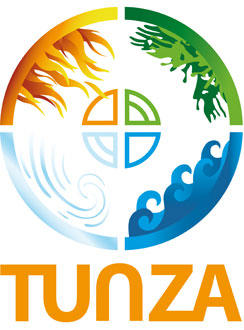 Iranildo de Sousa Ferreira was selected from thousands of applicants from around the world. He will be at the TUNZA International Conference in Indonesia until 01 October .
Iranildo de Sousa Ferreira was selected from thousands of applicants from around the world. He will be at the TUNZA International Conference in Indonesia until 01 October .
Iranildo helped to prepare proposals to be presented in the next United Nations Conference on Sustainable Development – Rio +20, and will evaluate the contribution of youth to the International Year of Forests and share his experiences of activism and his work with experts in the environmental area.
TUNZA will be held by the UNEP in collaboration with the Government of Indonesia. It will bring together 1400 children and youth, to discuss their role and inputs to the upcoming United Nations Conference on Sustainable Development – Rio+20. Under the slogan “Reshaping our future through a Green Economy and Sustainable Lifestyle”, the conference will also review the contribution of youth to the International Year of Forests and how they can adopt more environment-friendly lifestyles. The conference themes are Rio + 20 (Green Economy) / Green Lifestyles, Forests, Sustainable Consumption and State of the Global Environment from the youth perspective.
“This is not a time for pessimism or to turn a blind eye to environmental problems. It is time for constructive and decisive action because the alert signal has been given.” Iranildo says.
After an Amazing Arctic Experience, a résumé
 The inherent value of the Arctic – its genuine and honest nature – provided us with ideas and inspiration to last for a lifetime. The incredible modesty of the Arctic is astonishing. Neither icebergs, polar bears, puffins, rocks, nor any other part of this amazing ecosystem demand something from us. But we demand something from it. We want the fresh air that it gives us, we want to experience its beauty, we want it to stay in its current form. But at the same time most of our every day actions and behaviour demonstrate otherwise. Often they are harmful to the Arctic – harmful to the ecosystems on Earth, upon which life depends. Understanding the linkages, in which we as human beings are embedded, as various networks of ecosystems is an essential first step for changing our impact and to create change towards more sustainable societies and economies. In essence, it means to reconnect to what really matters to us as human beings.
The inherent value of the Arctic – its genuine and honest nature – provided us with ideas and inspiration to last for a lifetime. The incredible modesty of the Arctic is astonishing. Neither icebergs, polar bears, puffins, rocks, nor any other part of this amazing ecosystem demand something from us. But we demand something from it. We want the fresh air that it gives us, we want to experience its beauty, we want it to stay in its current form. But at the same time most of our every day actions and behaviour demonstrate otherwise. Often they are harmful to the Arctic – harmful to the ecosystems on Earth, upon which life depends. Understanding the linkages, in which we as human beings are embedded, as various networks of ecosystems is an essential first step for changing our impact and to create change towards more sustainable societies and economies. In essence, it means to reconnect to what really matters to us as human beings.

During the last week we – 17 young people from 12 different countries – supported by amazing trainers have begun to feel like a community, a strong community bond together by an inspiring and exceptional experience and the common wish to create a sustainable future. We will support each other and work together to reconnect to the environment we work in – on local, national and global scales.
Our actions, diverse in nature, are just waiting to be put into practice in our home countries and beyond. There will be challenges we will all face, but the inspiration of this Arctic experience outweighs them by far.
Maike Buhr
This post is an abridged version of a text taken from the British Council’s Arctic Climate Training blog Click here to learn more about the Arctic Climate Training project
Iranildo de Sousa Ferreira, Climate Champion from Brazil
Iranildo de Sousa Ferreira – International Climate Champions Brazil was a keynote speaker at Environment Week at the University of Fortaleza (UNIFOR) in Fortaleza, Ceará, June 7, 2011. The theme was “Science and Sustainability”. He spoke on the Scientific Basis of Climate Change: Vulnerability, Mitigation and Adaptation. Iranildo kicked off a rich debate about the main consequences of climate change for the state of Ceará and Brazil.
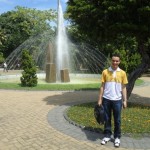 The University of Fortaleza (UNIFOR) held its Environment Week on 6. and 7. June 2011. Here I was invited to speak and debate the science of climate change. In my speech I talked about the scientific basis of climate change, using the final report of the Intergovernmental Panel on Climate Change (4AR-IPCC), the recent report of the 3rd WG-IPCC Energy and Climate Change Mitigation and the human contribution to climate change, to show the vulnerabilities, mitigation and adaptation of climate change. I also used the IPCC data and documents of the United Nations Framework Convention on Climate Change – UNFCCC, as well as the advances of the last negotiations at COP 16.
The University of Fortaleza (UNIFOR) held its Environment Week on 6. and 7. June 2011. Here I was invited to speak and debate the science of climate change. In my speech I talked about the scientific basis of climate change, using the final report of the Intergovernmental Panel on Climate Change (4AR-IPCC), the recent report of the 3rd WG-IPCC Energy and Climate Change Mitigation and the human contribution to climate change, to show the vulnerabilities, mitigation and adaptation of climate change. I also used the IPCC data and documents of the United Nations Framework Convention on Climate Change – UNFCCC, as well as the advances of the last negotiations at COP 16.
My speech ended in a debate about the main consequences of climate change in the state of Ceará in Brazil. Based on the scientific data that I used, there will be several consequences for the State of Ceará, especially the increase of extreme events like rising sea level and dryness.

Iranildo conducting discussion with the audience of the Week Environment of the University of Fortaleza - UNIFOR.
Regarding to Brazil, I mentioned that the consequences of rising temperatures will be worse for the North and Northeast of the country, a region that is called one of the hotspots of climate change. It may suffer from drought and decline in its biodiversity, water availability and the increase of extreme events. I also talked about the likely increase in rainfall in Southern Brazil and launching the kit of the UN Decade for Sustainable Development of the Ministry of Environment of the UNESCO Office in Brazil.
When you ask me about what it takes to reduce the effects of Climate Change, I would say that the first thing we should do is to change attitudes towards the issue and get involved in this process that concerns us all. The first tool is environmental education, because we are building our environmental citizenship.
The Environmental Week at UNIFOR was a remarkable moment for me, because after I brought the universities to discuss the issue of climate change, I am now invited by universities to explain and discuss the topic and that is all due to the opportunity to be an International Climate Champion.
Anoka Primrose Abeyrathne, Climate Champion from Sri Lanka
Anoka Primrose Abeyrathne has been an eco-activist for 14 years. She was nominated as a Climate Champion and Global Changemaker by the British Council. Anoka is also an AshokaYouth Venturer for Social Entrepreneurship. For the GLOBAL IDEAS Blog she will be writing about her work as a Climate Champion and her experiences with climate change.
Part I
People my age like to have fun. That is why the initiative we set up, is a “fun + action” initiative. Within the Sri Lanka Youth Climate Action Network (SLYCAN), we organize debates at university level, beach parties, replantation or clean-up campaigns, interactive workshops, discussion platforms, art exhibitions and and street theatre plays. All of these activities are popular with children and young people. They are the catalysts of change in the society, in becoming eco-responsible adults.
As a volunteer for the NGO EMACE Sri Lanka, I work with the communities of Bolgoda Lake in Sri Lanka on a grass roots level. This way we are creating a win-win situation. On the one hand we save the mangroves in the region. On the other hand we help the villagers by promoting eco-tourism or solar fishing lamps. We help to develop sustainable fishing techniques and we are looking for customers for the handmade and eco-friendly products of the people. A programme to train eco-tourism guides, handicraft methods and sustainable fishing is ongoing. All of these projects will be expanded at national level, collaborating with branches of EMACE and SLYCAN islandwide.
My work enabled me to be the SAARC Youth Award Recipient 2010, for Outstanding Contribution to the Protection of the Environment and Mitigation of Climate Change.
These may be small steps but the impact is growing and creating a wave of eco-positive change among youth in Sri Lanka.
Iranildo de Sousa Ferreira, Climate Champion from Brazil
Iranildo de Sousa Ferreira is a 16 year old student who has been working in the environmental area for several years. He is a student and lives in the city of Ibiapina, Ceará in Brazil. Protecting the environment is his passion. Iranildo is writing for the GLOBAL IDEAS Blog about his experience with climate change and about projects he’s working on.
Part I
I am very concerned about climate change as it has progressed in recent years from mere conjecture to suspicion, and finally to reality – backed by real data. Now we know for sure that around the world, year after year, decade after decade, the world’s temperature is rising.
In 2010 I was selected to be a British Council Climate Champion by the selection process of the Climate Generation Programme in Latin America and the Caribbean. As a Climate Champion, I’m doing several actions in my city, my state and country to increase public awareness about climate change. My aim is to change habits and encourage mitigation and adaptation. I initiated and am involved with the Brazilian Government’s first Young Brazilian delegation to the United Nations Climate Change Conference where I will exercise the role of president.
To legitimize the performance of my actions and my work as a Climate Champion got great support from the people at the British Council in Brazil, with whom I keep in touch through the Project Manager, Ana Paula Bessa, who accompanies and guides me in the execution of my actions.
When we work on the issue of climate change, we must remember that climate change will affect all living beings on our planet, and so we can minimize the effects, not only by using clean energy technologies but we need something much bigger – we need everyone’s help. We must act now and start from our homes, our schools, our institutions. We will prove that the human beings are not what they say but what they do.




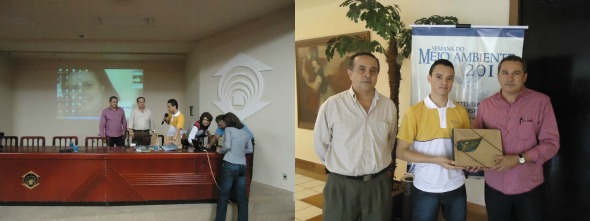
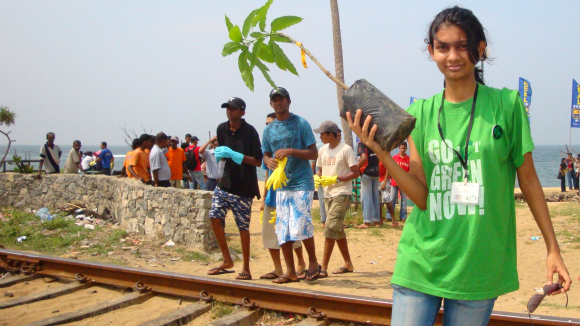
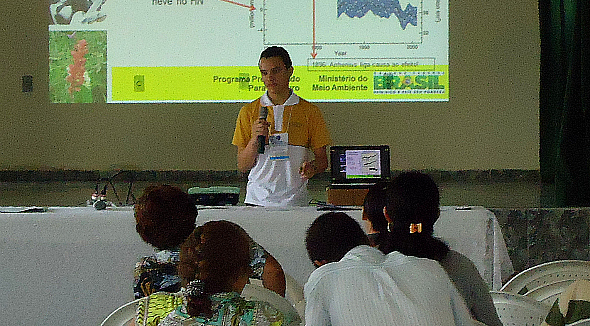




Feedback